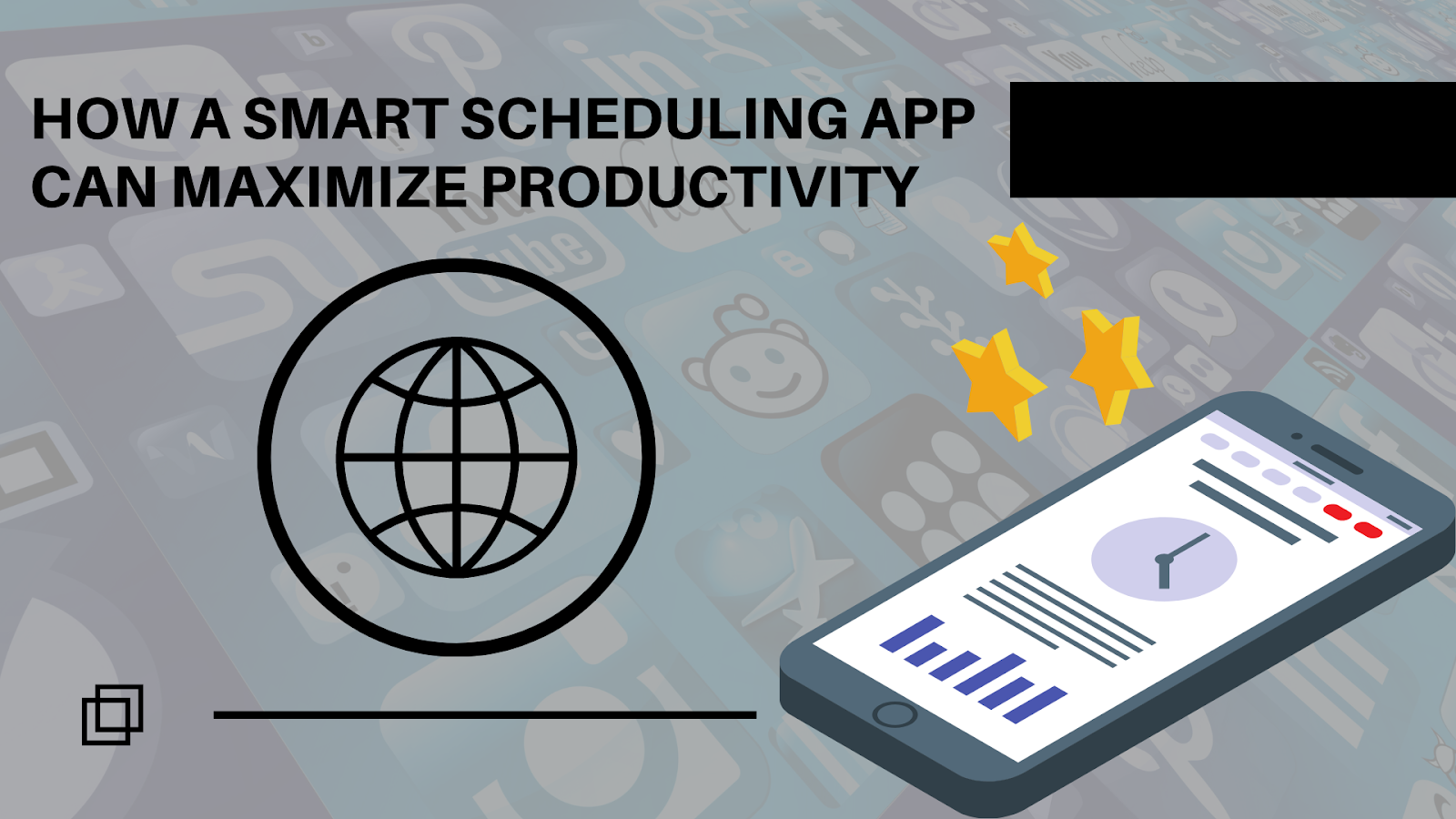How a Smart Scheduling App Can Maximize Productivity
In today’s fast-paced business environment, businesses are continuously looking for ways to improve their productivity and optimize operations. An evolving solution that is revolutionizing workforce management is smart scheduling apps. Implementing these innovative technologies has grown into an essential component in remaining competitive and attaining victory in contemporary volatile markets as businesses encounter great demands and challenges.
Smart scheduling apps help organizations streamline their employees’ work schedules, optimize resource distribution, and prevent disruptions using the latest technologies such as artificial intelligence and statistical analysis. These powerful tools can significantly transform an organization’s productivity and offer innovative features like automated shift changes, continuous tracking, and worker self-service, promoting employee satisfaction and increased participation.
Smart Scheduling App Benefits:
Smart scheduling app offers benefits like
- Improved productivity through balanced shifts and job delivery.
- Seamless integration with other business technologies simplifies entire workforce management activities.
- Knowledge from information for better decision-making and effectiveness in operation.
- Continuous tracking is employed to address planning difficulties and prevent interruptions.
- Satisfaction among employees has risen as a consequence of self-service options and programmable hours.
- Cost savings could be achieved by properly handling resources and decreasing expenses for overtime.
This pie chart showcases the challenges of scheduling

The Power of Real-Time Scheduling
One of the key advantages of smart scheduling apps is that they facilitate real-time scheduling. This lets firms preserve flexibility and adaptability through rapid schedule modifications as priorities change and unforeseen events occur. As an outcome, firms may react to evolving needs faster, thus increasing overall productivity and customer happiness.
Smart scheduling applications utilize real-time data and AI-powered optimization, to promote productivity through nimble scheduling practices. By constantly changing schedules and effectively assigning resources, companies can react quickly to evolving needs while boosting staff productivity.
According to research by McKinsey, companies that leverage real-time data for decision-making can improve productivity by up to 30%. Furthermore, a survey by Wasp Barcode Technologies found that 43% of small firms experienced reduced downtime and improved efficiency after implementing real-time scheduling solutions.
For small businesses, free tools like Homebase’s free employee scheduling app can provide an entry point to experience the benefits of automated scheduling. As needs grow, upgrading to a premium smart scheduling system unlocks additional customization and enterprise-level capabilities.

Optimizing Employee Allocation and Task Management
Intelligent task management and employee allocation optimization are other key features of smart scheduling apps, simplifying processes and increasing efficiency. These apps allow organizations to delegate assignments to the right people according to talents and availability resulting in a happier and more efficient staff.
But how could a smart scheduling app offer improved task management?
Skill-based task assignment – Smart scheduling apps assign jobs based on workers’ skills, experience, and preferences, resulting in increased work productivity.
Tracking of task progress – Managers get immediate data on the work status through smart scheduling app task boards and project views resulting in greater integration with evolving requirements.
Resource management – Smart scheduling apps allocate resources between teams to prevent bottlenecks and ensure the use of appropriate tools and equipment.
Task priority management – Task prioritization tools concentrate on essential tasks, assuring that they are done as soon as possible while allocating the less urgent tasks in accordance.
Task automation – Automation of tedious job duties saves up stall time for more significant work while strengthening overall productivity.
Task duration forecasting – Smart scheduling apps can accurately calculate the new job periods by looking at the previous completed tasks data, helping in ideal job scheduling.
Based on American Psychological Association research, linking staff talents and hobbies to tasks improves engagement among workers resulting in positively affecting productivity.

According to a survey conducted by the Society for Human Resource Management (SHRM), companies with effective task management procedures were 1.4 times more likely to have engaged staff. By utilizing smart scheduling apps to allocate suitable employees to the right tasks, companies can boost staff engagement and productivity.
Enhancing Communication and Collaboration
For businesses to flourish, strong communication and collaboration is important. Mistakes in the workplace are often caused by a lack of collaboration and ineffective communication. Based on the survey by Salesforce, 86% of workers and experts viewed these problems as the main reasons for workplace breakdowns.
So how could a smart scheduling app enhance communication and collaboration?
- Group messaging for effortless organization and updates.
- Easy file sharing to keep the customers informed and up to.
- Feedback loops and open communication is necessary.
- Shift hand-offs and remainders are computerized.
- Alerts for scheduling modifications in real-time.
- Cloud-based and mobile connections for remote workers.
Furthermore, a report by ClearCompany discovered that firms with potential communication tactics experience 47% less employee turnover rates. By facilitating seamless team coordination and transparent communication, smart scheduling apps foster collaboration and boost productivity.
Balancing Employee Workloads to Prevent Burnout
Organizations are increasingly worried about worker burnout and stress amid rising rivalry and increasing demands. Smart scheduling apps utilize information to optimize workloads across teams by minimizing overwork and enhancing satisfaction. By lowering employee overwork and burnout, they can ultimately improve satisfaction, retention, and productivity among the team.
Schedulers can monitor employee working hours and workload patterns to ensure an equal distribution. Benefits like shift swapping, vacation planning, and flexible scheduling options can additionally encourage workers to accomplish a better balance between work and life. Smart scheduling solutions can drive engagement by promoting work-life balance and rest.
Integration With Payroll, HR, and ERP Systems
A further significant advantage of intelligent scheduling apps is their capacity to integrate with current business processes such as payroll, HR, ERP, and accounting software. These apps simplify payroll operations by computerizing time tracking and maintaining attendance. The automatic transfer of vacation and leave data decreases HR’s admin load even more. In general, integrating systems leads to reduced mistakes, a quick exchange of information, less manual work, and greater efficiency within departments.
Companies can guarantee seamless integration and optimize the financial return on their current IT investments through the use of adaptable APIs. This partnership increases the efficiency of operations and the impact of smart scheduling apps for company achievement.
Ensuring Legal Compliance
Adherence to complex labor laws across nations and sectors is an immense obstacle in the management of the workforce. Smart scheduling apps provide powerful features that assist with legal compliance. Extra time and break management, analytics of labor costs, and vast audit records assist companies to stay competitive.
Smart scheduling apps successfully reduce compliance hazards by avoiding excessive breaches and offering equitable processes. Scheduling can be matched with an array of legal laws due to an individual rule setup. By adhering to legal requirements, companies can prevent fines and focus on boosting productivity while ensuring data security.
Addressing Key Scheduling Challenges
To highlight smart scheduling apps’ wide applicability, let’s explore how they address key challenges:
Meeting complex industry needs and complicated scheduling demands like healthcare, retail, and manufacturing. Smart scheduling apps offer flexible shift regulations, blueprints, and industry-specific connections to meet a wide range of demands.
Handling conflicting employee shift preferences: Bargaining and transferring alternatives can be found in smart scheduling apps. Workers can choose their specific schedules, which are then immediately optimized according to their skills and availability. This allows for fair and open work distribution.
Enabling remote workforce management: smart scheduling apps provide anytime, anywhere availability, calendar assistance, and various communication features for remote and dispersed teams. This contributes to efficient collaboration simpler.
The Future of Productivity is Driven by Intelligence
As the business landscape rapidly evolves, productivity is crucial for organizational success. However, complex, manual scheduling processes strain productivity. Smart scheduling apps provide intelligence, automation, and real-time optimization to transform productivity across industries. With powerful capabilities to streamline communication, task allocation, compliance, integration, and more, smart scheduling paves the way for the future of intelligent productivity management.
The future belongs to those who see possibilities before they become obvious.” – John
The time is now to implement cutting-edge solutions that create value. Reimagine productivity management with the power of smart scheduling today.
In a Nutshell
Smart scheduling apps have come about as an innovative means of improving staff management. These apps utilize real-time data and AI-powered algorithms, enabling businesses to increase efficiency by optimizing resource allocation and adjusting plans based on shift needs. Additionally, these apps’ adaptability and self-service options increase staff satisfaction and balance between work and personal life.
The cost reduction achieved through tailored scheduling techniques further improves the bottom line. As organizations strive to remain competitive and efficient, smart scheduling apps have become an essential component in enhancing staff management and achieving long-term success.







